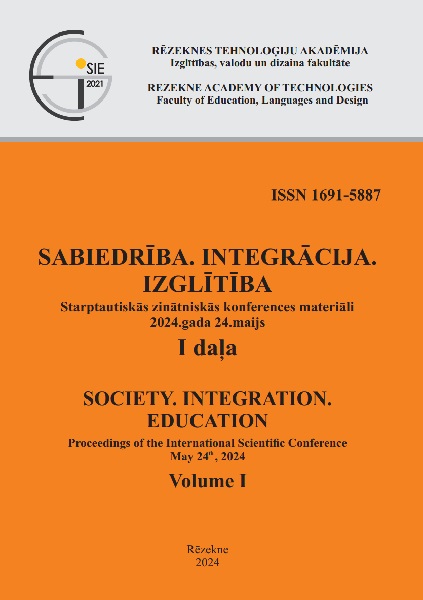PREPARING TEACHERS FOR INCLUSION IN LITHUANIA: TEACHER EDUCATORS’ APPROACHES TO DIVERSITY AND EXISTING CHALLENGES
DOI:
https://doi.org/10.17770/sie2024vol1.7895Keywords:
Inclusive education, personalised learning, differentiated learning, teacher trainingAbstract
Inclusive education is a universal pedagogical trend, covering a broad range of research areas such as race, ethnicity, gender, culture, language, religion, and ability. An inclusive system concerns the rights, social justice, and equity within education for all, especially the marginalised groups (UNICEF, 2022). Lithuania has officially rolled out new legislation (in 2011) and structural changes (in 2024) to its educational system, moving it from a multi-track system to an inclusive one. However, teachers have reported implementation difficulties such as differentiating teaching methods, fostering student socialisation, and lacking multiprofessional collaboration and dialogue with parents (Lakkala et al., 2019). Contextual urgency lies in the changing demographics of the student body and impacts the reconsideration of diversity and inclusion in Lithuanian classrooms. This study focuses on teacher educators' (TEs) perspectives at a major teacher training university in Lithuania. Semi-structured interviews were conducted with faculty members to understand how diversity and inclusion are understood, interpreted, and implemented within the faculty. This research revealed current practices within teacher training regarding diversity, highlighting strengths, challenges, and potential enhancements. Critical implications for preparing future educators for inclusive classrooms are discussed.References
Ališauskas, A., & Šimkienė, G. (2013). Mokytojų patirtys, ugdant mokinius, turinčius elgesio ir (ar) emocijų problemų [Teachers’ Experiences in Educating Pupils Having Behavioural and / or Emotional Problems]. Specialusis ugdymas, 1(28), 51-61.
Allday, R. A., Neilsen-Gatti, S., & Hudson, T. (2013). Preparation for Inclusion in Teacher Education Pre-Service Curricula. Teacher Education and Special Education, 36(4), 298-311. DOI: https://doi.org/10.1177/0888406413497485
Anthony, G., Hunter, J., Hunter, R. (2015). Prospective teachers development of adaptive expertise, Teaching and Teacher Education, 49, 108-117. DOI: https://doi.org/10.1016/j.tate.2015.03.010
Arnaiz-Sánchez, P.; De Haro-Rodríguez, R.; Caballero, C.M.; Martínez-Abellán, R. (2023). Barriers to Educational Inclusion in Initial Teacher Training. Societies. 13(2), 31. DOI: https://doi.org/10.3390/soc13020031
Barnes, C. (2011). Understanding social inclusion: A reappraisal. In G. L. Albrecht, K. D. Seelman, & M. Bury (Eds.), Handbook of Disability Studies (pp. 201-222). Sage Publications.
Bethere, D., Kasiliauskiene, R., Pavitola, L. and Usca, S. (2023). Teachers’ Attitude towards Inclusive Education: Latvian and Lithuanian Experiences, Social Sciences. 12(7), 365. DOI: https://doi.org/10.3390/socsci12070365
Bradley-Levine, J. (2021). Examining Teacher Advocacy for Full Inclusion. Journal of Catholic Education, 24 (1). DOI: http://dx.doi.org/10.15365/joce.2401042021
Braun, V., & Clarke, V. (2006). Using thematic analysis in psychology. Qualitative Research in Psychology, 3(2), 77-101. DOI: https://doi.org/10.1191/1478088706qp063oa
Clark, I. (2013). Formative assessment: Assessment is for self-regulated learning. Educational Psychology, 28(2), 205-207. DOI:10.1007/s10648-011-9191-6
European Agency for Special Needs and Inclusive Education. (2020). Initial teacher education, Country information for Lithuania - Teacher education for inclusive education. Retrieved from: https://www.european-agency.org/country-information/lithuania/teacher-education-for-inclusive-education
Fleming, N. D., & Mills, C. (1992). Not Another Inventory, Rather a Catalyst for Reflection. To Improve the Academy, 11, 137. Retrieved from https://digitalcommons.unl.edu/podimproveacad/246
Florian, L., & Black-Hawkins, K. (2011). Exploring Inclusive Pedagogy. British Educational Research Journal, 37(5), 813-828.
UNESCO. (2020) Inclusive teaching: preparing all teachers to teach all students. International Task Force on Teachers for Education 2030. Retrieved from: https://unesdoc.unesco.org/ark:/48223/pf0000374447
Johnson, R. (2005). An inclusive research agenda: Epistemology, methodology and research methods. In S. Nind, K. Rix, J. Sheehy, & K. Simmons (Eds.), Inclusive Education: Diverse Perspectives (pp. 45–66). Springer.
Lakkala, S., Juškevičienė, A., Česnavičienė, J., Poteliūnienė, S., Ustilaitė, S., & Uusiautti, S. (2019). Implementing Inclusive Education in Lithuania: What are the main Challenges according to Teachers’ Experiences? Acta Paedagogica Vilnensia, 43, 37–56. DOI: https://doi.org/10.15388/actpaed.43.3
Määttä, K., Äärelä, T., & Uusiautti, S. (2018). Challenges of special education. In S. Uusiautti & K. Määttä (Eds.) New methods of special education (pp. 13–29). Frankfurt am Main: Peter Lang. DOI: https://doi.org/10.3726/b13246
McCormack, A. & Thomas, K. (2003). Is Survival Enough? Induction experiences of beginning teachers within a New South Wales context. Asia-Pacific Journal of Teacher Education, 31(2), 125–138.
Mintz, J., Hick, P., Solomon, Y., Matziari, A., Ó'Murchú, F., Hall, K., Cahill, K., Curtin, C., Anders, J. and Margariti, D. (2020) 'The reality of reality shock for inclusion: How does teacher attitude, perceived knowledge and self-efficacy in relation to effective inclusion in the classroom change from the pre-service to novice teacher year?', Teaching and Teacher Education, 91, 103042 (11pp). DOI: https://doi.org/10.1016/j.tate.2020.103042
Mitchell, D. (2014). What Really Works in Special and Inclusive Education. Using Evidence-Based Teaching Strategie, 2nd ed. London: Routledge.
Prensky, M. (2001). Digital Natives, Digital Immigrants. On the Horizon, 9(5), 1–6. Retrieved from: https://www.learntechlib.org/p/104264
Richards, J. C. (2008). Teaching listening and speaking: From theory to practice. Cambridge University Press. Retrieved from: https://www.researchgate.net/publication/255634567_Teaching_Listening_and_Speaking_From_Theory_to_Practice
Rutkienė, A., & Ponomarenko, T. (2019). Initial Teacher Training Challenges in a Context of Educational Reform in Lithuania. In M. Kowalczuk-Walêdziak, A. Korzeniecka-Bondar, W. Danilewicz, & G. Lauwers (Eds.), Rethinking Teacher Education for the 21st Century: Trends, Challenges and New Directions (1st ed., pp. 140–149). Verlag Barbara Budrich. DOI: https://doi.org/10.2307/j.ctvpb3xhh.13
Shani, M., & Hebel, O. (2016). Educating Towards Inclusive Education: Assessing a Teacher-Training Program for Working with Pupils with Special Educational Needs and Disabilities (SEND) Enrolled in General Education Schools. International Journal of Special Education, 31(3), 1–23. Retrieved from: https://eric.ed.gov/?id=EJ1120685
Sharma, U. & Nuttal, A. (2016). The impact of training on pre-service teacher attitudes, concerns, and efficacy towards inclusion. Asia-Pacific Journal of Teacher Education, 44, 142–55. DOI: https://doi.org/10.1080/1359866X.2015.1081672
Tomlinson, C. A. (1999). The Differentiated Classroom: Responding to the Needs of All Learners. ASCD. DOI: https://doi.org/10.4236/jbbs.2017.76017
UNICEF. (2022). Inclusive education. UNICEF. Retrieved from: https://www.unicef.org/education/inclusive-education






